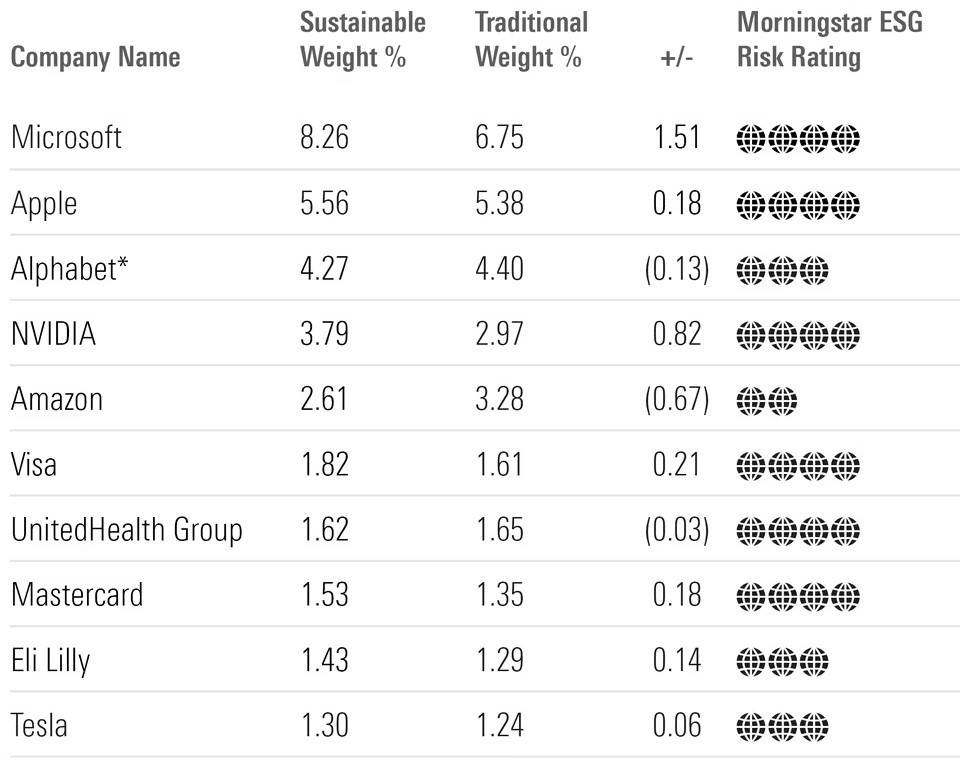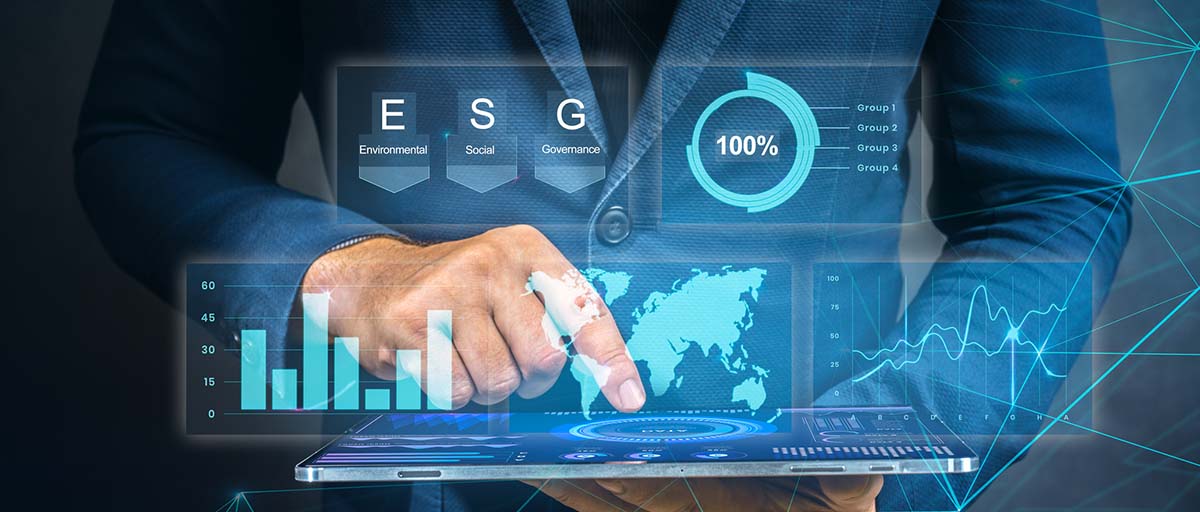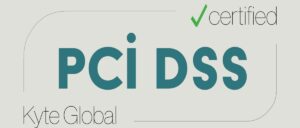Sustainable funds are expected to own companies that fit various environmental, social, or governance criteria or provide solutions to society’s sustainability challenges. Yet, the line often can feel blurred between what types of companies are found in a traditional fund compared with a fund that takes explicit ESG approaches.
We compared a variety of portfolios and found three stocks that large-cap ESG funds own at much higher exposures than their traditional counterparts: Microsoft, Nvidia, and Intuit. Additionally, there were three companies not widely held in traditional funds: Trane Technologies, Ecolab, and Aptiv. We include our assessments below from Morningstar analysts as well as from Morningstar Sustainalytics, a Morningstar company that provides ESG data and solutions.
Our Methodology
Generally, sustainable equity funds approach portfolio construction much the same as traditional fund managers, by searching for quality investments with long-term capital appreciation prospects and unique risk and return characteristics. Like all funds, these sustainable equity managers seek to outperform their benchmarks, minimize risk, and protect and expand their portfolios.
On top of that, sustainable funds also use ESG data and metrics to pursue their objectives. These approaches can vary. One approach might be excluding investments based on moral values. Others include limiting ESG risk, seeking ESG opportunities, or targeting sustainability themes. Despite headwinds from the anti-ESG movement, sustainability experts say that ESG investing has become more mainstream as an additional layer of insight to inform financial decisions.
As you might expect, there is also evidence of differing strategies when you analyze the distribution of weights among the holdings of both types of funds. Here’s what we did to compare the funds.
For large-cap ESG funds, we aggregated the holdings of the oldest share classes of all U.S. sustainable large-cap funds. We took the 200 securities that were most commonly owned and then calculated what the average weight of each stock might be in a theoretical portfolio that owned all 200 stocks. Each stock’s weight in the model was determined by taking its average weight and dividing it by the sum of the top 200 stocks’ average weights in the sustainable universe. As an example, if Microsoft had an average weight across the universe of 15%, and the sum of the 200 highest average weighted securities in the universe was 350%, Microsoft would have a model weight of 4.3%. This process for model creation was then repeated for the “traditional universe.” The traditional universe was defined for large-cap funds as the oldest share classes of U.S. large-cap funds, excluding sustainable funds.
Our objective is to gain insights into the unique or underweight securities held by sustainable funds in the large-, mid-, and small-cap universes. Securities in the sustainable model that hold a greater position than the traditional model are considered “overweight” in this study. “Unique” securities are those that are included in the sustainable model but not the traditional model.

*Position for Alphabet is the combined positions of Alphabet Class A GOOGL and Alphabet Class C GOOG. Source: Morningstar Direct. Weights as of Oct. 31, 2023. Data as of Nov. 17, 2023.
What ESG Stocks Did We Find?
Apart from Meta Platforms, the mega-cap companies known as the “Magnificent Seven” make a noticeable appearance among the securities in our model with the highest average weight. Except for Amazon.com and Alphabet, these market-cap giants (which also include Apple, Microsoft, Nvidia, and Tesla) are overweight in the sustainable model as compared with the traditional model. Why so much overlap?
The explanation lies in tracking error, a measure of volatility between a fund and its index.
“Most sustainable large-blend funds still aim to be suitable as core portfolio holdings, meaning that their performance should be similar to large-blend benchmarks,” says Alyssa Stankiewicz, Morningstar’s associate director for sustainability research. “To fully exclude a name such as Microsoft or Apple, which are large portions of the market, an ESG-focused fund would be courting significant performance differences compared with traditional benchmarks.”
Thus, it’s common for active ESG-focused portfolio managers to hold slightly more or slightly less in a given name. In the example above, Microsoft has a slightly higher weighting in our model compared with the Morningstar US Large Cap Index, which makes sense given Microsoft’s relatively good standing on ESG matters compared with industry peers, corresponding to a Morningstar ESG Risk Rating Assessment of Low.
Most Overweight Stocks
Microsoft and Nvidia make another appearance on a shortlist of the top three most overweight securities in ESG funds. Rounding out the trio is Intuit, a provider of small-business accounting software (QuickBooks), personal tax solutions (TurboTax), and professional tax offerings (Lacerte).

Source: Morningstar Direct. Weights as of Oct 31, 2023. Data as of Nov 17, 2023.
Trane Technologies, Ecolab, and Aptiv are the three highest-weighted securities in the sustainable model that were not held by the traditional model at all. Other “unique” investments include industrial automation company Rockwell Automation, water technology provider Xylem, and American Water Works, the largest investor-owned U.S. water and wastewater utility.
Below, we look at these three securities and include comments from Morningstar that describe the investment theses, as well as comments from Morningstar Sustainalytics about ESG risk.

Source: Morningstar Direct. Weights as of Oct. 31, 2023. Data as of Nov. 17, 2023.
Trane Technologies
Morningstar Rating: 1 star
Morningstar Economic Moat Rating: Narrow
Morningstar ESG Risk Rating Assessment: 4 globes
Price/Fair Value: 1.39
Trane Technologies manufactures and services commercial and residential HVAC systems and transportation refrigeration solutions. While the firm is domiciled in Ireland, North America accounts for over 70% of its revenue.
Ecolab
Morningstar Rating: 4 stars
Morningstar Economic Moat Rating: Wide
Morningstar ESG Risk Rating Assessment: 4 globes
Price/Fair Value: 0.88
Ecolab produces and markets cleaning and sanitation products for the hospitality, healthcare, and industrial markets. The firm is the global market share leader in this category with a wide array of products and services, including dish and laundry washing systems, pest control, and infection control products.
Aptiv
Morningstar Rating: 5 stars
Morningstar Economic Moat Rating: Narrow
Morningstar ESG Risk Rating Assessment: 4 globes
Price/Fair Value: 0.52
Another Irish-domiciled company, Aptiv provides automakers with components and systems that are in high demand from consumers and that government regulation requires to be installed. Aptiv’s high-growth technologies include advanced driver-assist systems, autonomous driving, connectivity, data services, and high-voltage electrical distribution systems for hybrids and battery electric vehicles.
Morningstar Disclaimers:
The opinions, information, data, and analyses presented herein do not constitute investment advice; are provided as of the date written; and are subject to change without notice. Every effort has been made to ensure the accuracy of the information provided, but Morningstar makes no warranty, express or implied regarding such information. The information presented herein will be deemed to be superseded by any subsequent versions of this document. Except as otherwise required by law, Morningstar, Inc or its subsidiaries shall not be responsible for any trading decisions, damages or losses resulting from, or related to, the information, data, analyses or opinions or their use. Past performance is not a guide to future returns. The value of investments may go down as well as up and an investor may not get back the amount invested. Reference to any specific security is not a recommendation to buy or sell that security. It is important to note that investments in securities involve risk, including as a result of market and general economic conditions, and will not always be profitable. Indexes are unmanaged and not available for direct investment.
This commentary may contain certain forward-looking statements. We use words such as “expects”, “anticipates”, “believes”, “estimates”, “forecasts”, and similar expressions to identify forward-looking statements. Such forward-looking statements involve known and unknown risks, uncertainties and other factors which may cause the actual results to differ materially and/or substantially from any future results, performance or achievements expressed or implied by those projected in the forward-looking statements for any reason.
The Report and its contents are not directed to, or intended for distribution to or use by, any person or entity who is a citizen or resident of or located in any locality, state, country or other jurisdiction where such distribution, publication, availability or use would be contrary to law or regulation or which would subject Morningstar or its subsidiaries or affiliates to any registration or licensing requirements in such jurisdiction.
MeDirect Disclaimers:
This information has been accurately reproduced, as received from Morningstar, Inc. No information has been omitted which would render the reproduced information inaccurate or misleading. This information is being distributed by MeDirect Bank (Malta) plc to its customers. The information contained in this document is for general information purposes only and is not intended to provide legal or other professional advice nor does it commit MeDirect Bank (Malta) plc to any obligation whatsoever. The information available in this document is not intended to be a suggestion, recommendation or solicitation to buy, hold or sell, any securities and is not guaranteed as to accuracy or completeness.
The financial instruments discussed in the document may not be suitable for all investors and investors must make their own informed decisions and seek their own advice regarding the appropriateness of investing in financial instruments or implementing strategies discussed herein.
If you invest in this product you may lose some or all of the money you invest. The value of your investment may go down as well as up. A commission or sales fee may be charged at the time of the initial purchase for an investment. Any income you get from this investment may go down as well as up. This product may be affected by changes in currency exchange rate movements thereby affecting your investment return therefrom. Any decision to invest should always be based upon the details contained in the Prospectus and Key Information Document (KID), which may be obtained from MeDirect Bank (Malta) plc.





